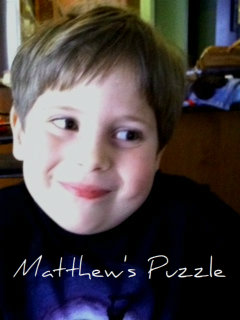Because Matthew, my son with autism, looks so “normal” many people don’t believe he has a disability. He has no visible problems, all of his limbs are well formed, he carries no telltale traits that would clue the casual observer into the fact that he struggles with many normal activities. Even extended family has questioned his diagnosis because during their brief encounters with him, he appears to be just fine. He looks “good”.
But in reality he has a pervasive developmental delay that touches almost every aspect of his life. Over the years of “looking good”, he has had to participate in physical therapy to help him learn to hold his head erect, crawl, sit, walk and run. He still works with an occupational therapist to help him with his fine and gross motor problems such as writing, coloring, ball play and balance, among other things. His autism has left him ill-equipped to deal with every day stressors and he is prone to bouts of anger and temper tantrums. He requires close adult supervision while at school because he does not have the attention span to stay on task, raise his hand, or complete his assignments. While my husband and I understand that his behaviors stem from his autism and how his brain handles (or doesn’t handle) certain situations, many people assume he is just a poorly behaved child and that we are negligent parents.
I used to feel bad if other people looked at us as if we had no control over our child, or as if we didn’t care. I used to think their opinions mattered. Then I realized that we are more involved in our child’s life than many parents. We know his moods intimately and read his actions to gauge what interventions are needed at that moment. Because of our devotion to Matthew we have actually been able to help him improve so much that his autism is no longer impacting him to the same extent it previously did. He has become extremely high functioning and we now feel confident that he will be able to attend college and hold a job in the future. Of course this now makes his autism even more invisible. He looks even more “normal” or “average”. And I guess ultimately we want his autism to be completely invisible, so invisible, that he no longer qualifies for the diagnosis. The reality of autism is that it affects a child’s behavior and physical condition without leaving physical markers, which in turn make it undetectable to many. Autism is an invisible disability.
Maryann is the mom behind Matthew’s Puzzle where she blogs about her son’s autism recovery.





















What a wonderful post.
She has a great site
She is a great mom and writer. I feel the same way about my son and autism.
Thanks for sharing his story!
Great post! I have two nephews who are autist.
Such a great post. I’m not really all that familiar with autism but I have such admiration for the parents who do whatever they can to make it easier on their children.
I have a couple of friends with children with autism, and they feel the same way. One child is highly functional like Matthew, but the other is on the opposite side of the scale. I’m looking forward to checking out her site.